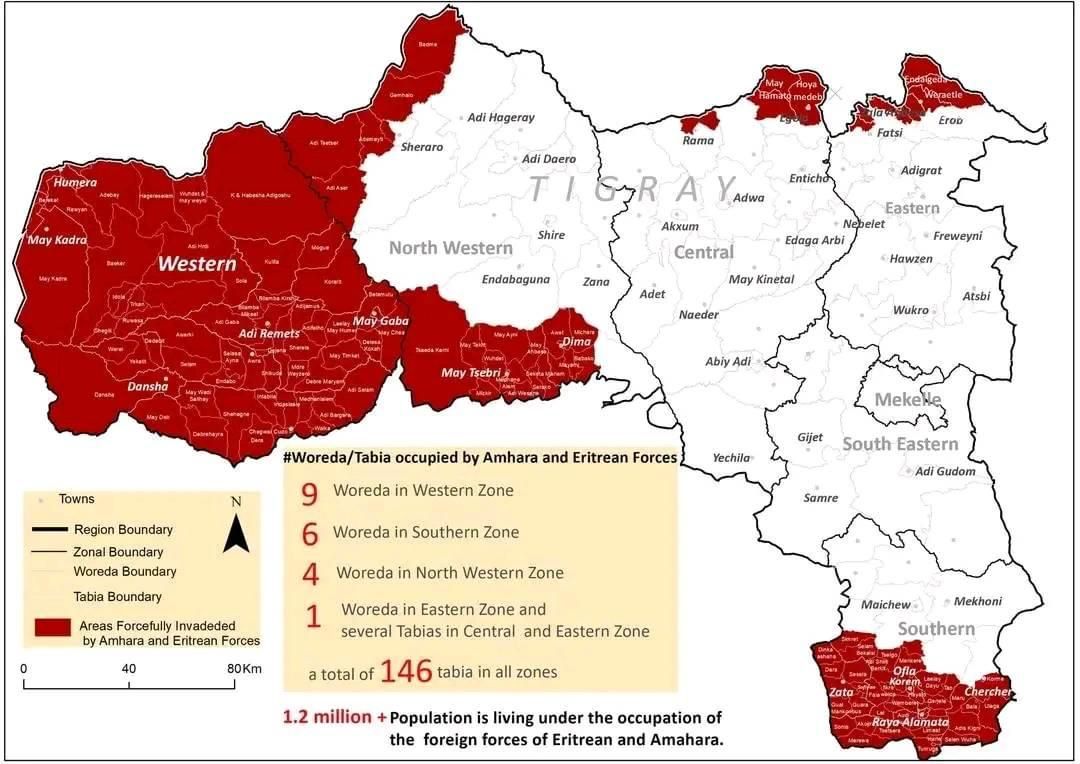Image taken from @OmnaTigray
By Addis-Alem Belay (PhD)
The ongoing conflict in Tigray has not only resulted in immense human suffering but also has significant geopolitical and socio-economic implications. One of the most contentious issues is the control over Western Tigray. If Western Tigray is not returned to the government and people of Tigray, several consequential damages can be anticipated, further exacerbating the crisis in the region.
Ethnic Tensions and Human Rights
Violations The non-return of Western Tigray is likely to perpetuate and exacerbate ethnic tensions between the Tigrayans and Amharas. The region, historically contested and rich in agricultural resources, has seen severe ethnic-based violence. Maintaining Amhara control over Western Tigray would likely lead to continued displacement of Tigrayans, forced evictions, and ongoing human rights violations. This could entrench ethnic divisions and create an environment of perpetual conflict and hostility, undermining any prospects for long-term peace and reconciliation.
Humanitarian Crisis
The humanitarian crisis in Tigray is already severe, with millions displaced and facing food insecurity. Western Tigray is an agriculturally fertile area, critical for the region’s food production. Denying Tigrayans access to this land would worsen the food security situation, depriving them of essential agricultural output. This would lead to prolonged dependency on humanitarian aid, exacerbate malnutrition, and increase the vulnerability of the population to disease outbreaks and other health issues.
Economic Implications
Western Tigray’s agricultural wealth is vital for the local economy. The region produces significant amounts of sesame and other cash crops, crucial for both local consumption and export revenues. If Western Tigray remains under Amhara control, Tigrayans would lose access to these economic resources, further impoverishing an already struggling region. This economic disenfranchisement could hinder any efforts at rebuilding and development post-conflict, leaving Tigray in a perpetual state of economic stagnation.
Political Instability
The continued control of Western Tigray by Amhara forces undermines the Ethiopian federal structure and the principle of regional autonomy. It sets a dangerous precedent for territorial disputes across Ethiopia, potentially leading to similar conflicts in other ethnically diverse regions. The political instability resulting from such a situation could weaken the federal government, lead to further fragmentation, and jeopardize the entire nation’s stability.
Loss of Trust in Peace Processes
For any peace process to be successful, it must address the core grievances of all parties involved. If Western Tigray is not returned to Tigrayan control, it would signify a failure to address one of the key issues for the Tigrayan people. This would lead to a loss of trust in national and international mediation efforts, making future peace negotiations more challenging. The perception of injustice and unresolved territorial disputes could reignite hostilities, undoing any progress made towards peace.
Regional Implications
The conflict in Tigray has regional implications, particularly concerning relations with Eritrea and Sudan. Western Tigray’s geopolitical significance means that its status can influence regional dynamics. The continued occupation by Amhara forces could strain Ethiopia’s relations with neighboring countries, complicating diplomatic efforts and potentially leading to broader regional instability.
Conclusion
The failure to return Western Tigray to the government and people of Tigray would have profound and far-reaching consequences. It would perpetuate ethnic tensions, exacerbate the humanitarian crisis, hinder economic recovery, destabilize the political landscape, erode trust in peace processes, and have adverse regional implications. Addressing this issue is crucial for achieving lasting peace and stability in Tigray and Ethiopia as a whole. The international community and Ethiopian government must prioritize a fair resolution to the territorial disputes to pave the way for reconciliation and sustainable development.

Addis-Alem, it is very interesting article. The message is clear. You are blindly advocating to return what was looted by TPLF from Amhara (previously Gonder province) to Tigray. What do you thing the Amhara people feel about this blind demand? It is SAD you are not advocating for lasting solution which could be changing the Ethnic based constitution. Each citizen of the country need to feel home in all corners of the country. Also, we have to have a national language in addition to our mother tongue if we want to have a country. Otherwise you have to make peace with Eritrea if you want to gain independence. There is no way you will have border access with Sudan.